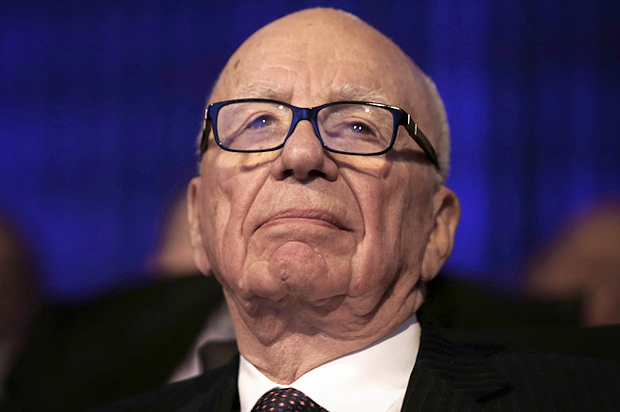 Rupert Murdoch is one of the world’s richest men, and the owner of News Corporation, which operates Fox News, The New York Post, and other major outlets.
Rupert Murdoch is one of the world’s richest men, and the owner of News Corporation, which operates Fox News, The New York Post, and other major outlets.
In addition to effectively owning countless news outlets across the world, Murdoch is also owner of movie and television powerhouse 21st Century Fox. Earlier this month, Murdoch made a nearly $80 billion offer to have 21st Century Fox takeover Time Warner, a move that was rejected by the company.
But Murdoch has not given up on his quest to merge the two media titans. As The New York Times noted, he is “determined and unlikely to walk away anytime soon, people briefed on the matter said. And he has a track record of pursuing companies that first said no before giving in.” This week it was reported that 21st Century Fox may be planning to increase its offer after its sale of Italian and German Sky TV holdings, which would generate an extra $13.5 billion.
While much of the press has focused on whether Murdoch will be successful in his bid, the bigger question is: what happens if he is?
A Mega Merger That Threatens Everyone
If Murdoch is successful in his latest bid, he will be furthering media consolidation in an era where an increasingly small pool of companies control most of what Americans see. For example, four companies own virtually all of local media, as this interactive map from media freedom group Free Press shows. Some are saying that the merger is itself a response to Comcast’s move on Time Warner Cable and AT&T’s move on DirectTV – meaning that mergers are leading to more mergers.
A Time Warner merger with 21st Century Fox would allow Murdoch to put companies such as HBO, TNT, and TBS (Time Warner) under the same umbrella as Fox News and FX ( Fox has said it would sell CNN to avoid running afoul of antitrust laws). The Los Angeles Times notes that one of the first losers under such a massive merger could be writers and producers:
What would likely be of tremendous concern would be the power a 21st Century Fox – Time Warner combination would have in the creative community, specifically writers and producers looking to make television shows and movies.
The majority of TV shows and movies are produced by just a handful of companies — Time Warner, 21st Century Fox, Walt Disney Co., Comcast’s NBCUniversal and Sony Corp. A merger of two of the biggest producers would eliminate a buyer and give that entity a lot of leverage.
“The increased buying power 21st Century Fox would have is a huge antitrust issue I would expect the Justice Department to look at,” said Derek Turner, research director of Free Press, a media watchdog group.
Essentially, the people who do the laborious work producing the television Americans enjoy would be facing an increasingly small cartel-like operation of owners who actually buy their productions, an easy way to further reduce their wages and increase company profits.
Given the benefits to the companies of being able to put the squeeze on those who produce the programming, why was Time Warner hesitant? Vox’s Matt Yglesias explains one likely reason: Time Warner’s shareholders would likely lose out due to Murdoch’s insistence on keeping control of voting shares of the company:
The merger makes business sense, and the price Murdoch is offering — about a 22 percent premium over the current market price of Time Warner shares — is fair. Nonetheless, Time Warner executives and board members are raising one big objection to the merger. Murdoch is offering some cash to Time Warner shareholders, but most of the purchase would be financed with shares of 21st Century Fox stock.
That’s a fairly standard practice, except 21st Century Fox stock is a bit unusual — it doesn’t carry any voting rights. Like many family firms, Murdoch’s company has a two-tier share structure with the bulk of the voting shares in the hands of the Murdoch family. Time Warner’s board says it would be a mistake for Time Warner shareholders to swap their voting rights in the company for non-voting shares of questionable value.
The solution to this ever growing world of media conglomerates would be, as the Free Press spokesperson says above, anti-trust actions.One observer has the following advice:
At this late stage, media companies have grown so large and powerful, and their dominance has become so detrimental to the survival of small, emerging companies, that there remains only one alternative: bust up the big conglomerates. We’ve done this before: to the railroad trusts in the first part of the 20th century, to Ma Bell more recently. Indeed, big media itself was cut down to size in the 1970s, and a period of staggering innovation and growth followed. Breaking up the reconstituted media conglomerates may seem like an impossible task when their grip on the policy-making process in Washington seems so sure. But the public’s broad and bipartisan rebellion against the FCC’s pro-consolidation decisions suggests something different. Politically, big media may again be on the wrong side of history – and up against a country unwilling to lose its independents [sic].
That observer was Ted Turner, himself the man behind Turner Enterprises and the rise of networks like CNN, writing in 2004. With increasing consolidation that threatens writers, producers, shareholders, and consumers, you have to wonder if Murdoch will be writing a similar column a decade from now.

